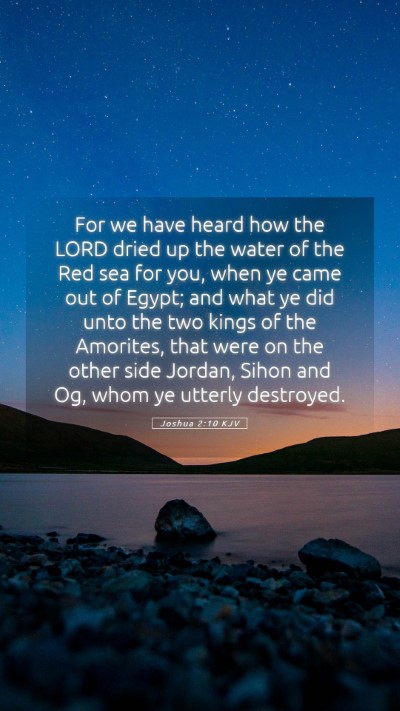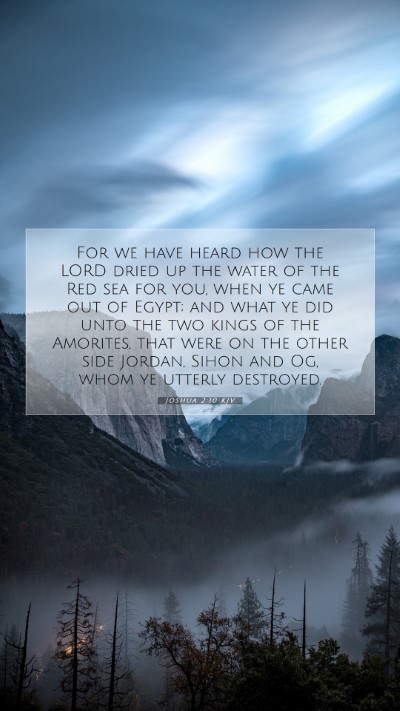Old Testament
Genesis Exodus Leviticus Numbers Deuteronomy Joshua Judges Ruth 1 Samuel 2 Samuel 1 Kings 2 Kings 1 Chronicles 2 Chronicles Ezra Nehemiah Esther Job Psalms Proverbs Ecclesiastes Song of Solomon Isaiah Jeremiah Lamentations Ezekiel Daniel Hosea Joel Amos Obadiah Jonah Micah Nahum Habakkuk Zephaniah Haggai Zechariah MalachiJoshua 2:10 Meaning
What is the meaning of Joshua 2:10?
For we have heard how the LORD dried up the water of the Red sea for you, when ye came out of Egypt; and what ye did unto the two kings of the Amorites, that were on the other side Jordan, Sihon and Og, whom ye utterly destroyed.
Joshua 2:10 Bible Verse Meaning
Bible Verse: Joshua 2:10
This verse illustrates a pivotal moment in the narrative of Israel's conquest of Canaan. It is spoken by Rahab, a Canaanite woman, who acknowledges the works of the Lord in the history of Israel up to this point.
Bible Verse Meanings
The phrase "For we have heard how the Lord dried up the water of the Red Sea for you" (Joshua 2:10) highlights a key aspect of biblical history—the crossing of the Red Sea. This event demonstrated God's power and commitment to His people, setting the stage for the Israelites to claim the Promised Land.
According to Matthew Henry, this verse not only signifies the fear that the reputation of such remarkable deeds instilled in the hearts of their enemies but also reflects the faith of a Canaanite who acknowledges Yahweh's sovereignty. It serves as a foreshadowing of Rahab’s subsequent actions, revealing her understanding and perception of God's greatness.
Albert Barnes notes that Rahab's recognition of Israel's victories is indicative of the fear that permeates the land of Canaan. Her confession of having "heard" reveals the transformational power of testimony and how God's workings are made known among the nations.
Bible Verse Interpretations
Adam Clarke emphasizes the significance of Rahab's faith in the Almighty, suggesting that her acknowledgment of God's past works equipped her with the courage to protect the Israelite spies. This recognition represents a turning point where a Gentile recognizes the true God amidst a polytheistic culture.
This act of faith underlines a theme that runs through the Scriptures: that God is not limited to His chosen people; rather, His mercy and power extend beyond Israel, paving the way for the inclusion of all nations in His redemptive plan.
Bible Verse Understanding
- Historical Context: This verse is set during the Israelites' transition from wandering in the desert to conquering Canaan. It highlights the fear and anticipation among Canaanite nations regarding Israel's military power.
- Character Insights: Rahab's character—a harlot—emerges as a surprising yet profound example of faith. She is later listed in the genealogy of Jesus, showcasing how God redeems unlikely individuals.
- Theological Implications: Rahab's confession reveals the knowledge of God and the recognition of His authority. It affirms that even those outside the covenant community can embrace faith and be recipients of God's grace.
Bible Verse Explanations
This verse illustrates the pervasive knowledge of God's deeds. Rahab's acknowledgment of Israel’s deliverance from Egypt and the miraculous nature of the Red Sea crossing indicates that the fame of God's acts preceded the spies. Her actions set the groundwork for a significant turning of events in God's redemptive story.
Bible Study Insights
Studying Joshua 2:10 encourages believers to understand the importance of historical context in biblical narratives. It invites readers into a broader understanding of how the actions and acknowledgment of others can reflect our own relationship with God.
Moreover, it challenges individuals to consider their own testimonies and how they might influence others regarding the fear and acknowledgment of God’s power in their lives.
Cross References
- Exodus 14:21-22 - The parting of the Red Sea
- Numbers 14:9 - The fear of Israel’s enemies
- Hebrews 11:31 - Rahab's faith and its commendation
Conclusion
Joshua 2:10 serves as a remarkable testament to God's wondrous deeds, how they resonate beyond Israel, and how faith can arise from unexpected places. It illustrates that the knowledge of God's power creates a rippling effect that prepares the way for spiritual outcomes that work towards divine purposes.


